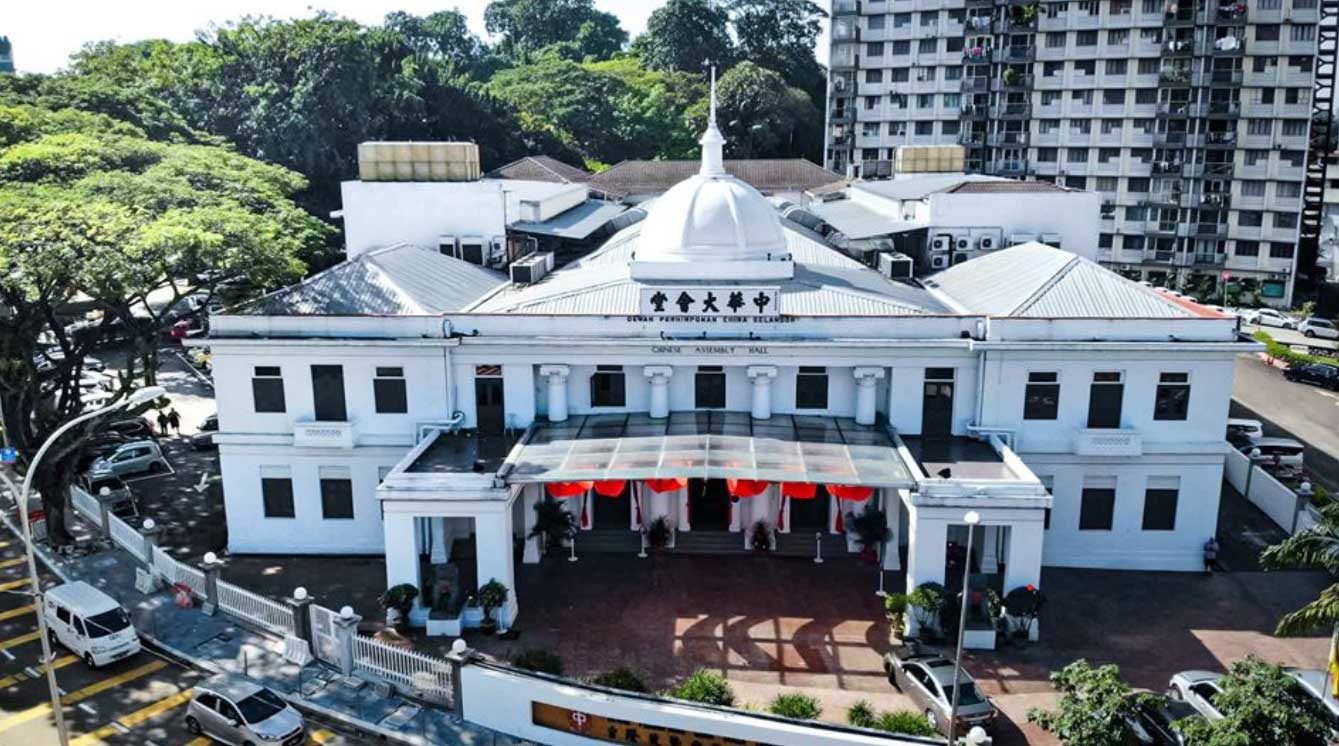The Engchoon Kuala Lumpur History Gallery






(1918 - 2008)
Qiu Xiangchi
Qiu Xiangchi was born in Wuli Street, Engchoon, Fujian. He migrated to Southeast Asia in 1938 and initially served as an art teacher before transitioning into business, where he thrived in the commercial arena. Starting as a broker, he later ventured into sailboat transportation, notably transporting rice and groceries from Alor Setar to Singapore. In 1945, he founded Nan Chang Company, specializing in the rubber industry, diversifying successfully into tin mining, electronics, and chemical industries, establishing himself as a successful entrepreneur.
During the Japanese invasion of Malaya, Qiu Xiangchi and Lin Lianyu joined the Selangor Medical Auxiliary Service in World War II, eventually evacuating to Singapore amidst fierce battles, where they provided medical aid under perilous conditions.
Beyond his achievements in business, Qiu Xiangchi actively contributed to vernacular education and cultural initiatives. From 1972 to early 1982, he served as Director of the Selangor Chinese Assembly Hall’s Cultural and Education Committee, vigorously promoting cultural and educational endeavors. From 1982 to 1986, he was elected as president of the Kuala Lumpur and Selangor Chinese Assembly Hall, dedicating himself wholeheartedly to national and ethnic causes, striving for ethnic equality and the promotion of Chinese culture.
During his tenure as Director of the Cultural and Education Committee, the activities at the Kuala Lumpur and Selangor Chinese Assembly Hall flourished. Notably, in 1977, they published a commemorative special edition totaling 600,000 words since its inception. In 1979, he chaired the Malaysian Chinese Language Reform Committee, overseeing the publication of “Outline and Examples of Chinese Language Reform for Malaysians,” by the Selangor Chinese Chamber of Commerce. Additionally, he actively promoted reforms in customs and etiquette, publishing “Examples of Chinese Etiquette.” In 1980, he chaired the Selangor and Kuala Lumpur Chinese Language Promotion Committee and organized the month-long inaugural Chinese Cultural Festival in 1981.
Qiu Xiangchi’s passion for cultural and educational development became more evident after he became the president of Kuala Lumpur and Selangor Chinese Assembly Hall. For example, from April to November 1983, within just seven months, the assembly hall hosted and promoted nine significant cultural and educational events including Confucianism seminars, discussions on Chinese education issues, Malaysian Chinese literary issues, the second Chinese Cultural Festival, etiquette reform movements, Buddhist and national cultural seminars, exhibitions on Malaysian Chinese literary history, drama symposiums, and workshops on Chinese language teaching and materials for Malaysian secondary schools. These activities were not only numerous but also pioneering within the Malaysian Chinese community, reflecting his broad and deep cultural vision.
Furthermore, during his tenure, the Chinese community faced challenges such as government restrictions on lion dance performance permits (except during Lunar New Year), limits on the use of Chinese characters on signage, and attempts to flatten Malacca’s Bukit Cina. Qiu Xiangchi actively engaged with authorities in resolving these issues. Particularly concerning Bukit Cina, he served as Chairman of the National Chinese Organizations’ Assistance Committee for the Qingyun Pavilion to safeguard the sovereignty of Bukit Cina, an important cultural heritage site for the Chinese community.
During Qiu Xiangchi’s leadership tenure, the Kuala Lumpur and Selangor Chinese Assembly Hall played a leading role among Chinese associations
Source: Provided by The Kuala Lumpur And Selangor Chinese Assembly Hall

Of particular exemplar significance, as a leader with a broad cultural vision, Qiu Xiangchi not only dealt with incessant interferences by authorities regarding Chinese culture but also actively utilized the elevated position of the Kuala Lumpur and Selangor Chinese Assembly Hall, in conjunction with the collective strength of other significant Chinese associations nationwide, to formulate a comprehensive cultural agenda in response to official national cultural policies. Before Qiu Xiangchi took office, in 1981, marking the tenth anniversary of the national cultural policy, the government had reviewed this policy, inviting opinions from the Chinese community. This was seen as an opportunity to rectify the policy, prompting enthusiastic responses from the community. However, it wasn’t until Qiu Xiangchi assumed the presidency of the Kuala Lumpur and Selangor Chinese Assembly Hall that the Chinese community formally submitted a comprehensive demand for a Chinese cultural memorandum to the government.
This memorandum, known as the “National Cultural Memorandum,” was jointly drafted by the Kuala Lumpur and Selangor Chinese Assembly Hall and 14 other major Chinese associations nationwide, including state Chinese Assembly Halls, chambers of commerce, and educational associations, after several months of deliberation and planning. Following the drafting of this memorandum, representatives from these involved associations convened an unprecedented National Chinese Cultural Conference on March 27, 1983, in Penang, attended by over a thousand delegates from various Chinese organizations and cultural circles. This conference not only endorsed the “National Cultural Memorandum” but also passed a cultural conference declaration and eight proposals.
The “National Cultural Memorandum” and the National Chinese Cultural Conference sparked widespread and profound discussions within the Chinese community at the time, with general affirmation towards both initiatives. In fact, the memorandum and the declarations adopted at the cultural conference fully reflected the sentiments and anxieties of the Chinese community, although the government evidently could not accept the Chinese viewpoints on national cultural policies. Despite the government’s refusal to accept the cultural memorandum from the Chinese associations, the submission of the “National Cultural Memorandum” and the convening of the cultural conference ignited a fervor in the Chinese community to promote cultural activities.
The emergence of the “15 Chinese Associations” allowed national Chinese associations to consolidate their efforts in promoting more beneficial plans for the Chinese community. The Resource and Research Centre was established on January 1, 1985, providing the community with an informational and theoretical institution to assist Chinese associations in making reasoned responses to government policies, measures, or major national issues based on accurate information. Initially proposed by The Federation of Alumni Association of Taiwan Universities Malaysia, in the establishment of the Huazi Resource & Research Centre received full support from the “15 Chinese Associations,” with planning primarily led by the Kuala Lumpur and Selangor Chinese Assembly Hall under the guidance of Qiu Xiangchi. Following its establishment, Qiu Xiangchi was unanimously elected as Chairman of the Management Committee of the Centre.
Drawing from the experience of the 1983 Cultural Conference Declaration and the “National Cultural Memorandum,” Qiu Xiangchi and other directors of the Kuala Lumpur and Selangor Chinese Assembly Hall, particularly Zhang Jingliang and Liu Xitong, began drafting a “National United Declaration of Chinese Associations” encompassing political, economic, cultural, and educational domains. This declaration was adopted by the Joint Meeting of the 15 Chinese Associations on May 19, 1985. Upon its publication, it garnered recognition and support not only from Chinese communities nationwide but also from ethnic Chinese-majority parties across the political spectrum.
Subsequently, on January 9, 1986, the “15 Chinese Associations” established the National Chinese Associations Civil Rights Committee, chaired by Qiu Xiangchi, to implement the goals outlined in the Chinese Associations Declaration. The declaration aimed to convey to those in power the Chinese associations’ demand for a fair and democratic society, while the Civil Rights Committee aimed to advance civil rights movements to achieve this aspiration. Qiu Xiangchi’s tenure as chairman was marked by his significant contribution in defining clearer development directions for Chinese associations and systematically advocating for ethnic rights within the Chinese community.
Shortly after the establishment of the Civil Rights Committee, Qiu Xiangchi stepped down from the presidency of the Kuala Lumpur and Selangor Chinese Assembly Hall due to constitutional limitations. However, during his tenure, he continued to influence and drive the development of the Civil Rights Committee, the “National United Declaration of Chinese Associations,” the Chinese Community Information and Research Centre, and the “National Cultural Memorandum.” These initiatives had a lasting impact on the development and direction of the Chinese community.
In 1993, Qiu Xiangchi was awarded the Lin Lianyu Spirit Award. The reasons for his award included his long-term active service to the community and significant contributions. Particularly noted was his role as the President of the Kuala Lumpur and Selangor Chinese Assembly Hall, where he facilitated the formation of the “15 Chinese Associations” and implemented a series of non-traditional plans that profoundly influenced the organizational development and efforts of Chinese associations in Malaysia.
It’s noteworthy that Qiu Xiangchi was a close friend and fellow native of Engchoon with Lin Lianyu. During the Japanese invasion of Malaya and Singapore, both participated in medical relief efforts amidst gunfire and bombardment. In the 1950s, Lin Lianyu actively opposed the “Final Objective” to prevent its passage, facing imprisonment as a consequence. During these times, Qiu Xiangchi was entrusted with the care of Lin Lianyu’s wife and children, this represents a testament to his character and integrity.
Centre for Malaysian Chinese Studies was established during Qiu Xiangchi’s leadership of the Kuala Lumpur and Selangor Chinese Assembly Hall
Source: Provided by Centre for Malaysian Chinese Studies

Qiu Xiangchi started from scratch and achieved success in his career, dedicating over forty years to various cultural and educational organizations. He previously held positions as advisor or president in multiple associations, including advisor to the Federation of Chinese Associations Malaysia (Hua Zong), advisor to the Kuala Lumpur and Selangor Chinese Assembly Hall, Kuala Lumpur Chinese Chamber of Commerce, Kuala Lumpur Engchoon Association, co-founder and honorary chairman of the Malaysian Academy of Arts, co-founder and honorary President of the Drama Art Research Institute, vice chairman of the Selangor Hokkien Association, treasurer of the Federation of Hokkien Associations of Malaysia (FUKMA), and director of the Selangor Fujian Association, among others.
Due to his contributions to the Chinese community, he was honored with various awards, including the Lin Lianyu Spirit Award. Additionally, he was recognized by the 23rd Board of Directors Meeting of the Kuala Lumpur and Selangor Chinese Assembly Hall during the assembly hall’s 63rd anniversary celebration in 1986. He also received the Cultural Honorary Award from the Malaysian Chinese Cultural Association in 1995 and was commended at the closing ceremony of the 22nd National Chinese Cultural Festival in 2005.
Note: This text is excerpted from Volume 3 of “Malaysian Chinese Personalities,” page 1038-1041, authored by Moh Siong Cheong and Liew Wen Hui.

